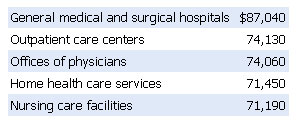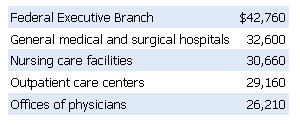Master Of Health Informatics: Program Rankings and Selection Criteria
A masters in health informatics prepares students to utilize today’s advanced information systems to create more efficient and productive healthcare environments. This program is ideal for healthcare professionals interested in improving an organization’s use of informatics and for information technology specialists seeking careers with biomedical or health organizations.
When you evaluate health informatics programs, it is important to know your career and academic goals. If you want to increase your knowledge, salary and job responsibilities, enrolling in a master’s degree program is a wise investment. The criteria outlined below will help you select a graduate school that will help meet your unique needs.
Your First Steps
If you’re seeking a graduate program in health informatics, your school choice is of utmost importance. This search process, which varies little from your prior search for an undergraduate program, consists of the following steps:

- Verify the school’s accreditation status and national ranking.
- Research degree programs, admission criteria, and faculty credentials.
- Inquire about online learning programs and campus locations.
- Determine your funding options, including scholarships, grants and financial aid.
Once you’ve considered the answers to these questions, you can narrow your list to a manageable number. The following information might help you with more in-depth research, so you can ask all the right questions and save yourself time and headaches in this selection process.
Accreditation Means Success
Accrediting agencies are private educational associations of regional or national scopes that develop evaluation criteria to assess a school’s legitimacy. The goal of accreditation is to ensure that the education provided by institutions of higher education meets acceptable levels of quality. Accreditation carries weight with employers and other colleges, in case you decide to transfer academic credits to other institutions.
In the field of health informatics, the only accreditation agency is Commission on Accreditation for Health Informatics and Information Management Education (CAHIIM). You can check the accreditation status of health informatics and health information management programs by using CAHIIM’s search engine.
By using the CAHIIM’s search engine, you can search by program name, state, and choose whether you’re interested in a program that offers distance learning. But, before you call about any institution, you might want to conduct more research online, including college rankings.
Program Rankings
Once you have chosen a number of accredited schools, you can now focus on rankings. A number of publications and organizations rank college programs, and the U.S. News & World Report and the National Institutes of Health are the most popular of these ranking lists.
Each publication and organization ranks schools based on a number of factors. Typically, school rankings are based on the following criteria:
- Financial aid options
- Professor experience
- Student achievements
- Percentage of students accepted
- Average standardized test scores
- Activities available
- Class size
While it is important to study school rankings, don’t rely solely on these reports. Visit social networking sites, forums and other online resources to learn more about a school’s history, program offerings, student experience, job placement rates, and more. Also, look into organizations such as AUPHA (Association of University Programs in Health Administration) or PAHCOM (Professional Association of Health Care Office Management) to learn more about your selected profession.
Also, top-ranked colleges may not fit your other needs, such as location, programs, or funding. In addition to ranking criteria, make sure to do a self-assessment to verify whether any program you research meets your other needs.
Other Needs
The following questions will help you gather the information needed to make the best decision about a graduate degree in health informatics:
- How convenient is that college that offers your intended major or area of interest?
- How much is tuition and other student fees?
- Do I have the time and financial resources required to be successful in the program? Does the school offer financial aid?
- Does the school offer online classes?
- What are the clinical hours required to graduate?
- What percentage of students has jobs within six months of graduation?
- Does the college have an alumni networking association?
- How helpful are staff members?
Conducting this research takes time, but the pay-off is well worth it. Employment in health informatics is projected to grow faster than average over the next decade. According to The Bureau of Labor Statistics, employment of medical and health services managers is expected to grow 16 percent from 2008 to 2018, faster than the average for all occupations.
What’s Important to You?
A graduate degree in health informatics can provide a needed salary boost, offer more benefits and offer a wider variety of job options. The table below provides a clue to management salaries throughout the U.S. in a variety of settings:

If you compare the salaries above, based upon a graduate degree in health informatics, to the salaries shown below at the undergraduate level, you may decide that a graduate degree is well worth your time and effort:

Choosing the right school is vital to your academic and professional success. If a school is accredited, you’re on the right track, especially if the school is recognized by CAHIIM. Learning about schools through online resources, personal interviews, and other selection methods will help you make the right decision.
Featured Master's in Healthcare Informatics Programs
Health informatics is the study of how technology, particularly artificial intelligence, computer science, and informational science relates to the medical field. This field of study is typically applied to clinical care, nursing, public health, and biomedical research. The universities and colleges listed below offer online master's degree programs in this subject
Looking for a health informatics degree?
Fill out this short form below, and we'll help match you to a college program that suits your interests, whether online- or campus-based.


 Catch up on nurse informaticist Anna Fernando's latest blog posts!
Catch up on nurse informaticist Anna Fernando's latest blog posts! 

